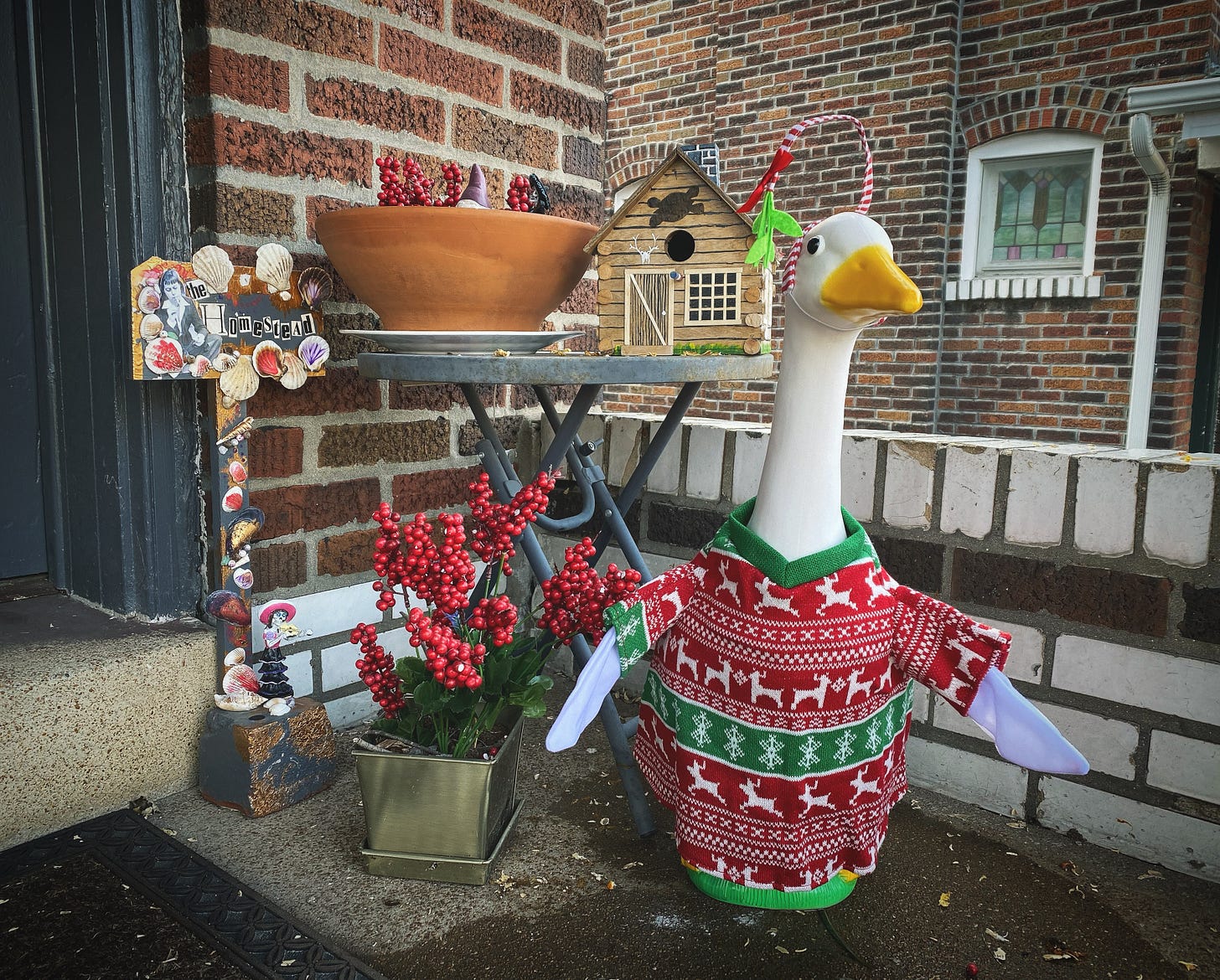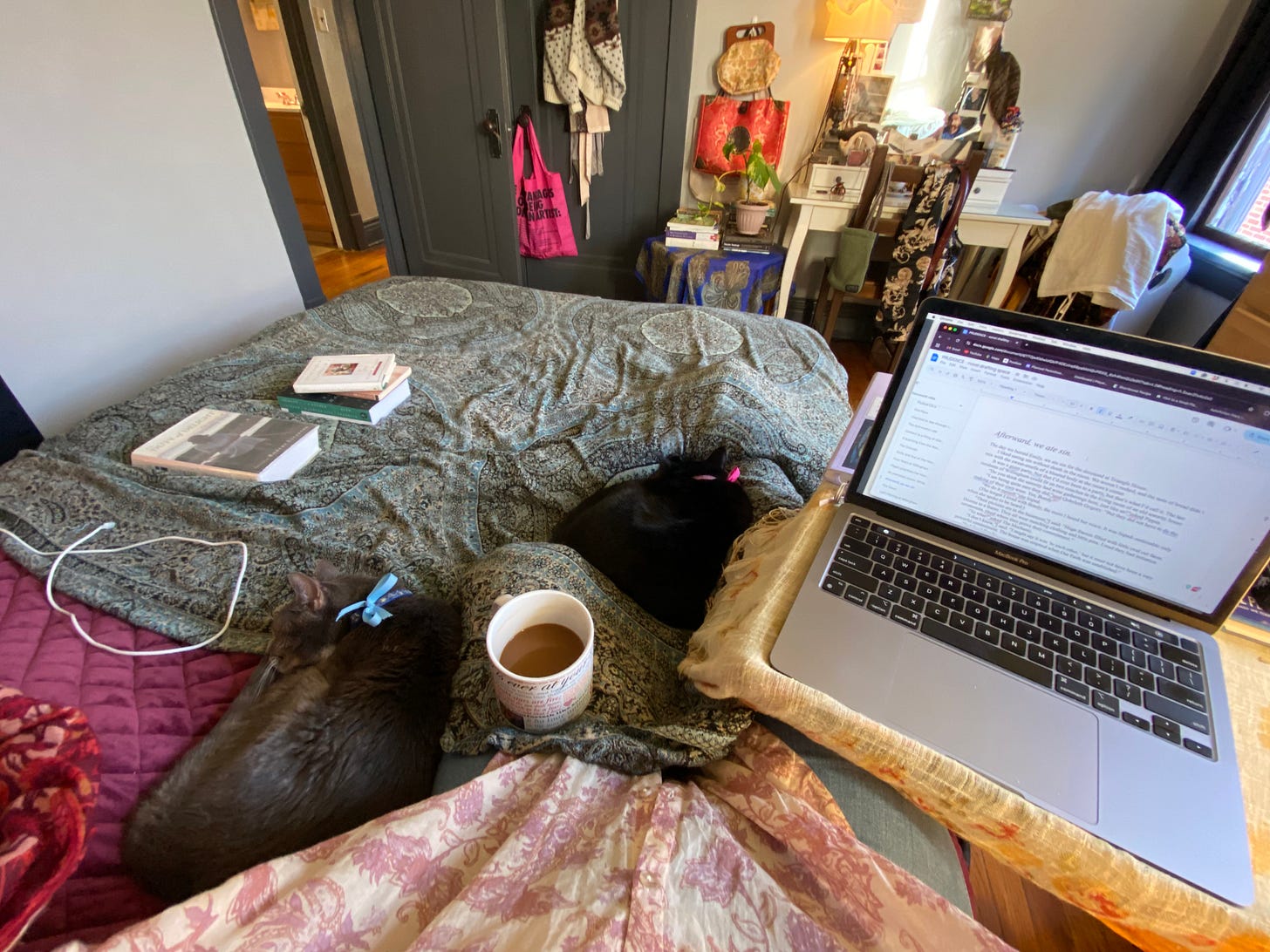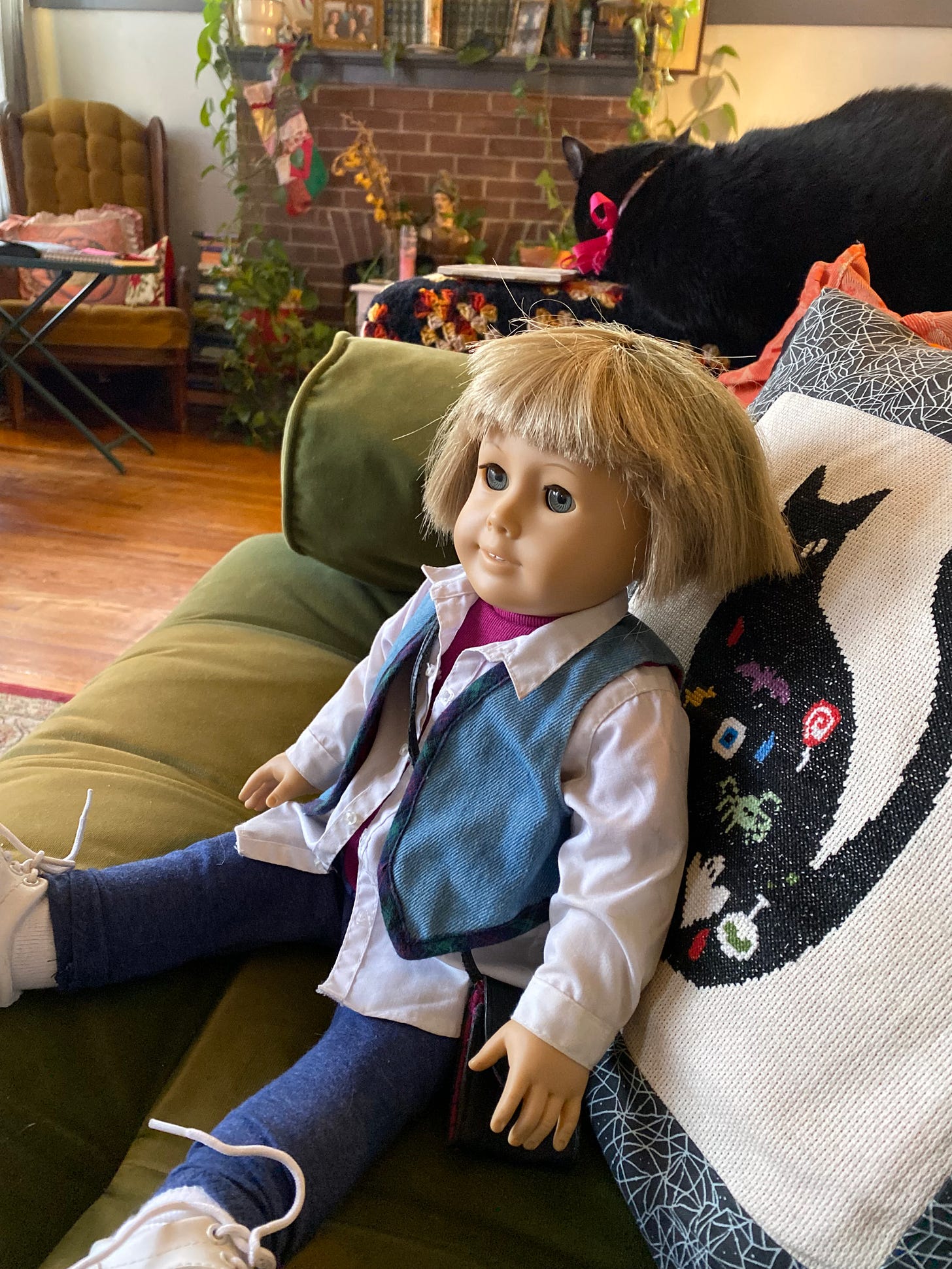37 learnings in 37 years... 🍰
A Secret Letters post for my paid subscribers: my yearly birthday post dedicated to *~learning~*. Inside: taste, pants, purified water, forgiveness, the 1995 Pride and Prejudice, etc.
I am 37 years old. I continue to be a silly goose.
Each year, as a personal tradition, I write a list of learnings for my birthday. I used to do this in my journal, but now I keep track of it here. I intentionally don’t look at the previous year’s list until after posting; seeing what’s changed or repeated is always fascinating. Some of these learnings are “big” things, but many are small and silly.
Turning thirty-seven hit me hard. Halfway through my fancy birthday pasta, I got horribly nauseous (I ate the cheese too fast) and had to lie down on the cold floor of the restaurant bathroom.1 Looking up at the ceiling, my back and neck comfortably chilled, I thought, Ah, so this is thirty-seven.
I was fine five minutes later.
This is, in fact, my chief “learning” of the past year: sometimes you’re okay, and then you’re not, and then you’re fine again. You have to ride the wave. 🤷♀️
Even silly gooses have to lie down on the bathroom floor sometimes.
(This post is for paid subscribers, but the first twelve “learnings” are free to see. After #12, they get a little more personal.)
Here are 37 things I’ve learned in 37 years:
1) Do not overthink simple text messages or Instagram DMs. I send so much nonsense to friends over Instagram DMs. I don’t overthink it anymore because, even if they don’t watch the silly reel I’ve sent them, they know I’m thinking of them. That’s enough, you know? A simple check-in text or random thought is no biggie, either. Just send the text. It’s only a text.
2) Go the extra mile to do your research, even if it’s weird. When you’re working on a writing project, the quality of the work increases in conjunction with how thoroughly you follow your interest. The more you dig into a topic, the more you can access rich subtext. Research (any research, honestly) enriches the world of the piece you’re creating. Example: I’ve been working on a novel about a lady pope. To better understand Roman Catholicism, I enrolled in an online RCIA (Rite of Christian Initiation for Adults) class to catechize myself. I get a certificate at the end of the class! (Does this mean I’m Catholic? Probably not. But I’ll carry that little certificate in my wallet to show I did my homework.)
3) Have opinions about your drinking water. I’ve been dealing with awful chronic headaches, and would ya believe it, things changed when I switched up my drinking water. As it turns out, I’m sensitive to St. Louis’s hard tap water. Drinking purified water has mostly cleared up my headaches and fatigue—it is a game-changer. It’s a simple thing, but it’s made all the difference.
4) Buying pants (especially jeans) is a brutal process of trial and error. You will not get it right the first time. You will lose money on buying pants. Lots of money. You will maybe cry. You are not alone. Measure your preferred inseam and carry around the number in your wallet. Not all wide-leg cuts are created equally. Here are my current favorite pants.
5) Two cats are better than one. Can’t believe I’m saying this, but it’s true. I took in my parents’ elderly cat, Old Linus, this summer, and now I can’t imagine my home without him and Midge. Yes, there is more litter to deal with. Yes, I am awakened every morning by their violent hunger meows. But they enrich each other socially, and I take so much joy from watching them interact.
6) All plays and novels make promises to their reader in the first third of the piece. The quality of a piece is determined by how well it fulfills those promises. I’m sure you could say the same of other mediums, but I’ve noticed this truth the most in plays and novels this year. My new refrain for revision is this: What have I promised the reader? Am I fully aware of all those promises? Can I fulfill them honestly?
7) You won’t get a solid tarot reading unless you treat the ritual seriously. I learned how to read tarot in the past few years. This may sound spooky, but if you don’t approach the cards respectfully (reading them in a place where you can sit up straight, shuffling, asking your questions aloud, etc.), you won’t have a fruitful reading.
8) Bread is easy to make. People are most afraid of working with yeast. You will become a champion once you get over the fear of that tricksy yeast. I recommend buying Fleishman’s yeast in the brown jar (not the little packets) so you can have room for error. Here is the recipe that got me into challah baking.
9) I’m a better friend now than when I was married/had a live-in partner. I don’t mean this to be insulting to my married or cohabitating friends, but it’s a true statement for me. With control over my space and schedule, I have the capacity to be a good friend. (At least, I hope I am being a good friend.) And because I have plenty of time alone to recharge instead of emotionally supporting another live-in human, I can be present when I’m out with others. This is mostly a me-problem, okay?— when I was younger, I tended to get fixated on “the relationship.” My friendships suffered. I’m grateful that I’m able to make up for lost time in my late thirties.
10) It’s a gift to be the keeper of your family’s old pictures. When my Granny passed away in 2022, I became the storage receptacle for many of our family’s ancient pictures. My great-great-grandparents sit above my mantle, watching me work. Could they ever have imagined a life like mine?
11) I sleep better in nice pajamas. I really do. Treat yourself to nice pajamas.
12) The 1995 BBC Pride and Prejudice helped me stop worrying about my body’s weight fluctuation. One of the reasons I love this adaptation more than the others is because the Bennet sisters aren’t bean poles. There is so much skinniness in our popular media these days, much like the vibe of the late 90’s. This miniseries stands out because it doesn’t reflect the trend of tiny waists in 1995. These women are beautiful and help remind me that my body is beautiful, too. (Disclaimer: I know everyone has their journey with this whole mess called embodiment. I’m just noting that this tidbit has helped me specifically. Also: obsessed with Mary Bennet’s withering look.)
(I was going to put the paywall here, but I decided learning is for everyone lol)
13) Groups, groups, groups. People succeed in groups. Creative sustainability comes from actively participating in the groups surrounding you—your artistic community, creative colleagues, writing groups, friends’ projects, friends’ shows, etc. Show up and be counted. If you want a creative group around you, you have to bring something to the table that they will enjoy, appreciate, or have a hand in creating. Seek collaborators, not followers.
14) Spend money on nice hair products. It’s taken me decades to come to terms with my hair texture. I’ve finally started paying for quality regarding my hair products (specifically for wavy-curly, thinner hair). This is my current favorite.
15) Asking for forgiveness is a multi-step process. Step one is falling on your sword. When you ask for forgiveness, you must sacrifice pride. You must fall on your sword, even if you feel like you were the one who was right. For some people, this will always be impossible. I wish them luck.
16) You cannot “curate” your community. They are people, not art objects. The friends you invite into your home are not display items. Take a step back from your “vision” of community and be honest with yourself about who is actually there. Love and care for those people. (Also, people know when they’re being “curated.” It sucks.)
17) The older I get, the more I understand the concept of prayer. This year, I read Mary Karr’s memoir Lit, which is loosely about her conversion to Catholicism. As I’ve gotten older and faced genuine relational pain, as well as a total shattering of who I thought I was and the life I was building, I’ve realized how much better I feel when I close my eyes and listen for something like a god. This past year, I’ve asked for plenty of things (a book deal, better writing, more self-control, more money, days without headaches), but I’ve also done a lot of listening. I don’t hear much of anything. But I do feel better after trying to listen.
18) The first two years of sobriety make you feel superhuman. The third year makes you feel decidedly human once more. When I first got sober, I felt monstrously strong. I felt like an elite human, able to abstain and wake up without hangovers. Now that I’m inching towards a full three years, I see how often I crave a drink. I smell it, and I want it. I see it, and I can imagine the taste. I go to meetings more than I ever did in years one and two—because I finally see how hard this is. (If you are seeking sobriety support resources, I recommend The Luckiest Club. Similar meeting structure to AA, but founded by a woman and made for easier accessibility. It’s not free, but it’s worth it. A great read: Push Off From Here by Laura McKowen.)
19) Don’t buy the mums unless you’re willing to put them in the ground. I never get them in the ground. They always die on the porch. I intend to learn my lesson.
20) The projects are the practice. You genuinely do get better at things the more you practice, and you will practice more if you don’t think you’re “practicing.” For myself, I always have to feel like the work I’m doing is geared toward a specific project. It’s hard for me to just putz around; I need to think I’m headed somewhere. I’ve noticed this the most in my clarity of concept lately. The more I push myself to see projects conceptually first (i.e., what’s the big question or promise?), the more the “practice” I’m doing is just part of the work of making the project happen.
21) I don’t miss teaching college. I apologize to any of my former students, but I don’t miss college teaching. I realized this in the past year. I just don’t miss it, and I don’t have any pull to return to academia. How strange, right? Maybe one day I’ll have a change of heart, but for now, the door is closed.
22) The Dollar Tree is part of my mental health toolkit. I need you to know that you can buy giant pillar candles for $1.25 at The Dollar Tree. You can buy little gnomes and fairies. You can buy seashells. You can buy notebooks. You can buy hats. You can buy pretty socks. You can go wild when you feel like you need to go wild. I give you permission to go wild.
23) If you are constantly emotionally monitoring your partner, you need to go to therapy and/or break up. (Don’t worry, I did both.) It took me all of my twenties to learn this lesson, and I’m still working on it today. Emotional monitoring means checking every little vibe or flinch and trying to make it better—this is at the root of codependent behavior, in which you pour your energy into making sure the other person is always happy. I am only responsible for my own emotions, not my partner’s. It’s not my job to make sure they are “okay.” I can show compassion when they are upset, but it’s not my job to “fix” it.
24) Prescription strength tretinoin (retinol) cream plus Vaseline has made my skin the best it’s ever been. I got my tretinoin prescription through Nurx. One tube lasts me nearly a year (just the tiniest pea size once a day). There was definitely a warm-up period where my skin did not like the retinol (very dry), but it was worth it to push through.
25) Epsom salt baths help you sleep. They do. Go take a bath before bed.
26) A little Neosporin inside your nostrils can help prevent colds. It’s also great for irritated ear piercings. I do the nostril trick whenever I go into crowded places, especially parties and planes, but I’ve also started using it recently on my irritated ears.
27) I used to be afraid of ghosts. Now, I want nothing more than to see one. I am on a Shirley Jackson kick right now, fixated on the significance of hauntings and the unexplainable. I don’t necessarily want to summon a ghost (it seems rude), but I wouldn’t be upset if a ghost just showed up. Here is the root of this desire: I’m ready to be surprised by something I can’t explain. Come at me, cosmos. Surprise me.
28) Get an electric blanket. As a Southerner, my electric blanket (thank you, Mom and Dad!) is the chief tool that gets me through the winter. If you can afford to be warm, then get yourself warm.
29) As much as I try to expand my horizons, Dansko is still my favorite shoe brand. Someone’s gonna have to bury me in these clogs. They are supportive, easy on and off, and make me a bit taller. I’ve worn many Dansko clogs in my life, but these are my current ones.
30) I’m done with caring about my grammar in text messages. One of the most frustrating elements of English literature academic culture is an emphasis on technical perfection as a protective measure (i.e., How can I trust you as a careful scholar if you keep making typos?). This is an instrument of elitism. May our texts be messy but still say what we want them to say.
31) The majority of good interior design is lighting. Lamps, lamps, lamps. Your home instantly looks nicer when you light it with lamps, lamps, lamps.
32) You will only improve as a writer if you share your work. The act of hitting publish on a post is the seed of improvement—hitting publish repeatedly without the stress of perfectionism will turn you into a writer with a voice. My plays changed when I started writing them with the end goal of sharing them. The same is true of my novels (dear lord, please light a candle that my agent sells my book in 2025)—once I began imagining a real reader, the quality changed.
33) Taylor Swift is the singer-songwriter of our generation. When I’m an old lady, these are the songs I will sing as I lose my mind. I can’t wait. Don’t you dare try to argue with me.
34) Keeping a diary is an essential artistic practice. It doesn’t have to be fancy. A boring, spotty account of your day is enough. We must do something to record our lives, and I’m not convinced social media is the correct artifact. I remain a lover of analog. An example of my style of journaling: “Up early to teach at the prison. Listened to ghost stories podcast on the drive. Ate tuna sandwich at Subway for lunch. (Is it bad to eat giant tuna fish sandwiches every Friday? Am I poisoning myself with mercury?) Wrote a little in the Subway. The sandwich maker said my hair looks like a character from the Sims. House is cold. I don’t like this pen.”
35) You must take risks to develop taste. Your sense of taste is connected to your exposure, and what you are exposed to is a function of risk. Taste comes from reading everything, seeing everything, listening to everything, questioning everything. Like Virginia Woolf says (which I always quote in my workshops), “Read a thousand books, and your words will flow like a river.”
36) 10% of a play is concept, vision, image, character, and story. The other 90% is whether it is fun for your friends to perform. The secret is that the fun is what unlocks that first 10%. People who are enjoying themselves can hold concepts, visions, images, characters, and stories in their arms and give them to others with grace. Write so that your friends enjoy themselves.
37) It is better to be awake than to be happy. In my play Romanov Family Yard Sale, one of the refrains the characters asked was, “When was the last time you were being happy?” I’ve asked myself that many times over the last year, but I’m more resolved to be awake than happy. I want to be alert to what’s around me. Sensitive. Soft. Present. Responsive.
And most of all, interested.
I’m not pregnant, mom!










